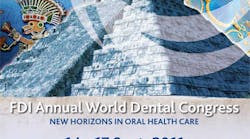I presented two continuing education courses on
Collaborative Practice. Dr. Orlando Monteiro da Silva (Portugal) officially acceded to the FDI presidency. Dr. Monteiro da Silva operates his own dental practice in Porto. He is a Fellow of the European Association of Dental Public Health, President of the Portuguese Dental Association, and Vice-President of the Portuguese-Speaking Countries Dental Association. He is also a former President of the Council of European Dentists and of the Portuguese Dental Association. A graduate of the Dental Medicine Faculty of Porto University, Dr. Monteiro da Silva has served in the Portuguese Air Force as Dentist Second Lieutenant.FDI launched the Global Caries Initiative (GCI) in 2009. The GCI is a profession-led "call to action" to eradicate caries, and thus, improve the oral and general health of populations globally by the year 2020. Dental caries affects the lives of billions of people around the world, posing an enormous public health challenge in its complexity, scale and impact, both at an individual and community-wide level. The GCI aims to establish a broad alliance of key influencers and decision-makers from research, education, clinical practice, public health, government, and industry, partnering in a common goal: to effect fundamental change in health systems and individual behaviour to achieve the 2020 goal. It is recognized as one of the leading initiatives in facilitating the paradigm shift to a preventive model of caries management. During 2009 and 2010, FDI engaged with a wide and diverse range of stakeholders around the world. One of the key achievements in 2010 was the work in developing a caries classification and management system (CCMS), which will lay the foundation for the preventive model of caries management. The CCMS will be included in a Global Oral Health Improvement Matrix that will integrate oral health into health, thereby establishing a collaborative, prevention-oriented model of oral health care. This will ultimately result in measurable improvements in oral health and, and thus health, in all communities. With noncommunicable diseases now at the top of the global health agenda following resolutions at the United Nations and WHO, FDI is taking a proactive leadership role in advocating for oral health in the lead-up to a United Nations Summit on Noncommunicable Diseases, which took place in New York in September 2011.A key element is establishing the Global Oral Health Initiative (GOHI), a multi-stakeholder partnership to address the burden of noncommunicable diseases with a special responsibility for the oral diseases of dental caries (Global Caries Initiative), periodontal disease, and oral cancer. GOHI's objective is to provide strategic leadership to coordinate and synergize policy, strategy and programs within a common stakeholder framework, so as to implement a model of oral health care based on health promotion, disease prevention, and preventive disease management worldwide.FDI's bid for oral diseases to be mentioned specifically in the Declaration from the United Nations Summit on Noncommunicable Diseases was a success. Thanks to its own lobbying and direct action by FDI member national dental associations (NDAs), as well as to the sustained efforts of a number of other governmental and non-governmental stakeholders, the Declaration's Article 19 now recognizes that "renal,
oral and eye diseases pose a major health burden for many countries and that these diseases share common risk factors and can benefit from common responses to non-communicable diseases."The Administrator of the United Nations Development Programme, Helen Clark, has called oral diseases "obstacles to development." In her address, "Intersectoral Collaboration to Advance Socio-Economic Development and Achievement of the Millennium Development Goals," she highlighted the development impact of oral diseases. "Low and middle income countries face variously alarmingly high and/or rapidly increasing rates of oral diseases, including tooth decay, cancers, and Noma," Ms. Clark said. "These challenges can be exacerbated by weak health system capacity, and by a lack of focus on oral health- despite its importance for sustaining overall health. The result is unnecessary death and disability on a large scale from oral diseases." The September 19 United Nations Summit side event was sponsored by the United Republic of Tanzania and co-sponsored by Australia and Sweden, with a keynote address by Tanzanian President Jakaya M. Kikwete. Kikwete expressed his deep concern over the burden of oral diseases for Tanzania and other resource-constrained countries. The event was moderated by Ali Velshi, Anchor and Chief Business Correspondent for CNN, and included discussion of the "Global Burden of Oral Diseases: Common Risk Factors Connecting Oral Diseases to Non-Communicable Diseases and Integrating Oral Health into Primary Health Care-Practical Solutions." Present at the event, FDI President Orland Monteiro da Silva said: "I was very impressed by the debate and discussion and learned a lot about the impact of oral diseases on developing countries. I certainly came away with a much better sense of the extent of the problem and possible solutions." Also present, FDI Executive Director Jean-Luc Eiselé added: "This is knowledge that FDI very much needs to have at its fingertips. It will inform and advise our current strategy on Africa." For more information, visit
www.beta.undp.org/undp/en/home/presscenter/speeches/2011/09/19/statement-by-helen-clark-undp-administrator-un-summit-on-non-communicable-diseases-side-event-putting-teeth-into-the-ncds.html.











